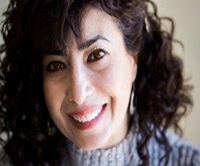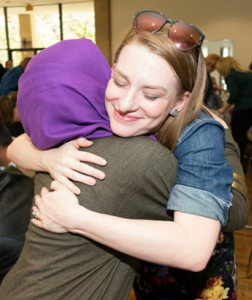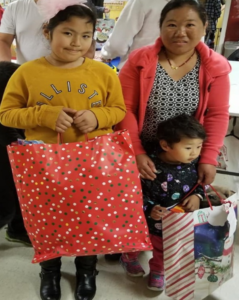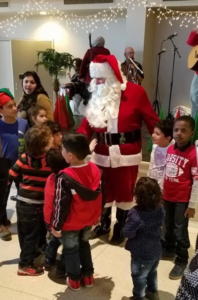 “For I know the plans I have for you,” declares the LORD, “plans to prosper you and not to harm you, plans to give you hope and a future. Then you will call on me and come and pray to me, and I will listen to you. You will seek me and find me when you seek me with all your heart.” (Jer. 29:11-13)
“For I know the plans I have for you,” declares the LORD, “plans to prosper you and not to harm you, plans to give you hope and a future. Then you will call on me and come and pray to me, and I will listen to you. You will seek me and find me when you seek me with all your heart.” (Jer. 29:11-13)
Crossing the Rio Grande is one of the scariest things I have ever done. It happened about 20 years ago, a day after learning that the Iranian embassy in Mexico discovered we were in Mexico City. We rose early the next morning and set out to cross the border to apply for asylum in the U.S. In desperation, we found two Mexican men who said they could get us across the border. They told us that we could only carry a backpack and water.
When we arrived at the river, I was nearly paralyzed by fear of the high and swift-moving water. I don’t swim, and just looking at the river made me dizzy. But, turning back was not an option. One of the Mexican men carried my younger son on his shoulder and was moving through the river very fast. My then-husband had my older son while at the same time trying to hold onto me. The dizziness increased and I became even more unstable. As the man carrying my younger son got farther and farther away, my parental fears turned into panic. I was terrified that we would get separated from him or worse – lose him to the river. I started screaming at my husband to just let me go and catch up with the man carrying my younger son. As a parent, I was willing to drown so that my sons could make it safely across.
When we finally made it across the river, our guides left us in the middle of the desert. They told us that we were in the U.S. We walked for hours and hours. We were exhausted, starving and running out of water. Eventually, we saw in the distance the bridge into the U.S. and a few buildings. We walked into the immigration post, told them our story and asked for asylum. They were convinced we were Mexicans and wanted to send us back. As I listened to that rejection, I was filled with fear. My mouth was dry and my heart was pounding. I did something I had never done before – I begged.
 I did not beg for myself, but as a mother. The only thing that truly mattered, as I faced the border officers, was the well-being of my children. A part of me recognized that a once middle-class, college-educated Iranian woman is now a dirty, dusty mother who is only concerned about getting her children to safety.
I did not beg for myself, but as a mother. The only thing that truly mattered, as I faced the border officers, was the well-being of my children. A part of me recognized that a once middle-class, college-educated Iranian woman is now a dirty, dusty mother who is only concerned about getting her children to safety.
The experience of becoming a refugee, then asylum seeker strips you of your pride and dignity. It reduces you to survival instincts, and often to feeling that you are nothing. There are wounds so deep that even today I choose not to discuss them. But, God is merciful! In God’s indescribable way, God uses those wounds for Kingdom purposes – if we will allow him. Common belief is that life’s wounds heal. But, that is not always true. And, some wounds are better left unhealed lest we forget and harden our hearts to the suffering of others. Lest we forget that we are mere humans and in the blink of an eye, our lives can turn upside down and be in need of mercy, as mine did.
I was born and raised in Iran as a Muslim. My Christian journey started at the age of 6 when I had a vision of the Virgin Mary. God planted a seed of love in my heart, and God continued to grow the seed in the form of a deep love for the Church; however, as a young Muslim girl growing up in an Islamic theocratic country, I knew little about the Church, and even less about Jesus. I married a Sunni Muslim when I was very young. My husband was persecuted as part of the discrimination against religious minorities in Iran. We escaped Iran 18 years ago with no resources or documentation. God miraculously brought us to Mexico, and eventually to the United States. On the first day of our arrival in Dallas, God connected us with a Baptist church through the ministry of an unlikely person who invited us to church. I was baptized there six months after our first visit. The ministry of that church, to a Middle Eastern family that looked nothing like them, was absolutely incredible.
With the help and support of the church, we started building a new life of faith. With the guidance of the pastor, I was admitted into seminary, all without transcripts or record of my prior education. Next, God moved me to the Episcopal Church even though, at the time, I did not understand why. My Baptist church, however, remained my loving family. I was ordained as a priest in the Episcopal Church, and toward the end of my curacy, I started praying about what the next stage of ministry would look like for me. The answer came quickly, even though I did not feel ready for what seemed like an immense task with few resources. I left parish ministry and started a church mobilization ministry, called Gateway of Grace, which has become the largest refugee ministry in Dallas.
 It presently has fifty partner churches and organizations, spanning various denominations, and is continuing to grow. As my husband and I were praying for a name to give this new ministry, I remembered what my Baptist church had done for us and how its ministry had changed my life.
It presently has fifty partner churches and organizations, spanning various denominations, and is continuing to grow. As my husband and I were praying for a name to give this new ministry, I remembered what my Baptist church had done for us and how its ministry had changed my life.
The church’s seemingly unending flow of grace toward us stood out to me, and I was reminded of the truth that the main difference between Christianity and other religions was God’s grace made manifest in the world through God’s people. I knew the Church, as the instrument of God in the world, was the gateway of God’s grace. I chose the name Gateway of Grace because it reflected the nature of the Christian ministry my family and I experienced from the Baptist church. I cannot imagine what turns the course of my life would have taken without that church. Perhaps God would have used another church to reach out to me. Regardless, the faithfulness of that Baptist church, the Christian community and the Body of Christ transformed our lives. I am forever grateful to God!
I see the tribulations, losses and pains that my family and I experienced, and in contrast, I also recognize the way that God used my Baptist church to prepare me for the ministry of church mobilization. Since childhood, God had given me a heart of deep and unconditional love for the Church, and through my experience as a refugee, God also gave me a heart of compassion for refugees. Since starting Gateway of Grace in 2010, as a church mobilization ministry, I have learned a substantial amount about the obstacles that women face in ministry, about parachurch ministries and about ministry to refugees and immigrants.
At Gateway of Grace, we emphasize that we belong to the human family. What hurts people across the world pains us. From the same dust, we are all created, and from the same breath, we all are given the breath of life. Christ’s death was for everyone in the human family, and God’s desire for all is healing, restoration and eternal life.
We celebrate the courage and resilience of our refugee families who are striving, even toiling to make a new home in a new land. Try to comprehend what it is like to leave behind, with a few hours’ notice, everything you have, to journey at someone else’s direction, to eat only when someone feels compassion for you, all the while not knowing if there is a future and a hope.
We provide a loving community to those fortunate enough to arrive in a new country yet are not welcomed. Nevertheless, their determination to survive and provide for their families is proven by their willingness to take the most menial jobs and thrive at them.
We pray for the 70.8 million displaced people who are forced to abandon their home because of war, persecution, famine and evil governments. For some, there was no time to sell their homes or cars or businesses. For most, this was not a problem because all their possessions had been destroyed or taken. Regardless, they took only what they could carry on their backs. The value of their college degrees and their respected reputations have been reduced to memories that often feel like a dream.
We remember those who are imprisoned, persecuted, relegated to unsafe refugee camps and languish in lands where there is no hope of escape. We grieve for persecuted Christians and other persecuted religious minorities, political prisoners, abused women and victims of human trafficking. Their physical scars often pale in comparison to the severe trauma that will be with them for the rest of their days.
We acknowledge that we too were at one time spiritual refugees, roaming through life apart from God and controlled by governance of the evil one. Yet, in God’s amazing grace, God poured out his mercies on us, rescuing us from the wastelands of life, bringing us into his family, giving us a home, a future and a hope. In filling us with the Spirit, God simultaneously called us into the serving; to strive for justice and peace for the least, the lost and those hoping for a new life.
We are intentional about discerning opportunities to be a part of God’s Kingdom work in bringing hope, peace and dignity to the marginalized of the world.
We respond by meeting the practical, emotional and spiritual needs of our refugee families no matter what they might be. Gateway of Grace partners with over 100 churches across denominations nationwide to serve refugees and has served thousands of refugees. One of the hallmarks of Gateway of Grace is our holiday celebrations with our refugee families. When my family and I came to the U.S., holidays were so difficult and lonely. When I started Gateway of Grace, I wanted to make sure refugee families had holiday parties to attend. Our Thanksgiving Dinner with Refugees on Thanksgiving Day draws about 400 people. This is a very nice event where we serve our refugee families in a beautiful setting, decorated tables, music band, beautiful food and lots of fellowship, laughter and friendship.
 At our Christmas party, over 300 refugees experience the joy of the season and all children receive Christmas gifts. Santa Claus shows up and everybody sings fun carols, something my children did not experience during our first few years in the United States. At our Easter Egg Hunt and Family Day, over 600 refugees and Americans spend the day eating, building friendship, playing bingo and doing other activities, and children enjoy a great and fun egg hunt. Our refugee families know that they are loved and they don’t have to believe what we believe in order to be a part of the community and participate.
At our Christmas party, over 300 refugees experience the joy of the season and all children receive Christmas gifts. Santa Claus shows up and everybody sings fun carols, something my children did not experience during our first few years in the United States. At our Easter Egg Hunt and Family Day, over 600 refugees and Americans spend the day eating, building friendship, playing bingo and doing other activities, and children enjoy a great and fun egg hunt. Our refugee families know that they are loved and they don’t have to believe what we believe in order to be a part of the community and participate.
Gateway of Grace has a school that provides English as a Second Language classes, citizenship classes and other programs. We have about 150 adults and children attending, gaining language skills and growing in confidence.
Through years of experience and close relationships with our families, Gateway of Grace has come to know the deeper needs of refugee families, particularly refugee women. Our newest ministry is called Family Enrichment Ministries.
What is Family Enrichment Ministries?
FEM is a new initiative of Gateway of Grace Ministries that provides healing, restoration and a practical pathway forward for refugee families to flourish. While the ministry serves the entire family, there is a specific emphasis on encouraging and empowering refugee women and young mothers who are often ill-equipped to successfully adjust to the vast opportunities and rights within American society. FEM also comes alongside refugee men through building relationships and mentoring to help them find their new identity, strengthen their marriages and successfully lead their families.
What are the needs of refugee families?
Depending on their region of the world, refugee families arrive in America having experienced everything from war trauma, illegal imprisonment, political and religious persecution, torture, abandonment, and loss of all their earthly possessions. The emotional and psychological wounds are deep and varied. The immediate need to learn how to survive in our competitive and capitalistic society is overwhelming and frequently is a source for depression. The pressures can lead to marital discord and challenges with parenting in a vastly different culture. Refugee families do not have the support system of extended families or a church community. Lack of the English language further isolates the family, especially the mother since she often had little opportunity for education while in her country of origin. The few programs in the North Texas area that exist to support refugees are not designed to address the deep struggles refugee families face in ways that are culturally sensitive and holistic. Meanwhile, thousands of refugee families strive daily to survive while many of them fail in various ways. Like every family, refugee families need a support system and community to share their journey. Unlike the average family, they need support to unravel months and, in many cases, years of horrific conditions in their country of origin and refugee camps in order to flourish in their new, permanent home.
What are Family Enrichment Ministries’ solutions?
FEM is the response to years of experience and working with refugee families, listening to hundreds of stories of struggles and serving thousands of refugees through Gateway of Grace Ministries. The ministry’s founder and executive director, Dr. Samira Izadi Page, knows firsthand many of the struggles since she too was a refugee from Iran more than twenty years ago as well as a Muslim background believer. Samira understands the fear and trauma of being a refugee. She also understands what refugee women face as well as the challenges of learning a new culture. Many years ago, Samira dedicated her life’s work to bringing awareness to the needs among refugees and serving their communities. Part of her effort is the successful mobilization of about one hundred churches that faithfully serve alongside Gateway of Grace in a variety of ways. Samira’s theological education, background, personal experience and commitment to serving refugee families combine to become the driving force for Family Enrichment Ministries. The core areas of ministry are:
Leadership Development Initiative
LDI is a track within GOG’s ESL program, with an emphasis on women, in which students who demonstrate either leadership qualities or a desire to learn to become a leader are selected, then encouraged, mentored and challenged to develop as leaders. Guest speakers from a variety of high-profile sectors within the community share core leadership principles that are designed to be discussed, studied and implemented immediately. Students are tasked to develop a service-learning project in which many of the leadership principles shared throughout the term are applied in real-life situations.
Pastoral Care and Counseling
As staff and volunteers develop deeper relationships with refugee families, a wide range of counseling and pastoral care needs are discovered. From doctor and ER visits and hospital stays to loss of a loved one back in their home country to loneliness and depression, the ministry is there to provide care and comfort as well as a safe place. Domestic violence is a harsh reality many women and children face. Serving abused refugee women who have no support system, do not speak English, do not know about resources available to them or their rights has become a growing area of ministry. Providing pastoral care to them in their own language by someone who knows their culture is a huge first step in bringing them into a loving community and healing.
Marriage Enrichment
A healthy marriage is hard work. It can be the hardest work ever when a couple is trying to cope with the dramatic life changes of being refugees in a new country with a completely different culture. Refugee couples need to adopt to a new way of seeing marriage and one another. The ministry provides teachings, instructions and question/answer sessions to address head on the problems common to all marriages, those unique to refugee families and the unique circumstances surrounding the family. Sermons and audio teachings are also made available for Christian refugees.
Refugee Men Support
Developing relationships with refugee men is one of the most important among all relationships with the ministry. Refugee men prove to be at the center of what does and does not happen in the family. Unfortunately, they can be some of the most challenging to reach because of work commitments. The ministry has created two platforms for reaching them. First, there is a men’s fellowship within Grace Community, our Christian worshipping community. This is a Bible-based fellowship that encourages men to prioritize the Biblical perspective on leadership and developing accountable relationships with other Christian men, especially those who share similar journeys as refugees. The other men’s group is an outreach to Muslim refugee men, mainly husbands of our female students who, because of work and other commitments, do not often have access to healthy communities to foster the kind of leadership that will lead to successful living in America.
We are humbled and grateful that the Lord allows us to be a part of building a future for our refugee families. I am reminded every day of the amazing privilege of serving refugees. I also know that I cannot do it alone.
I need your help and support. If you would like to learn more about the significance of reaching refugees, you can take a look at my book, Who Is My Neighbor?
To learn more about the ministry, to partner with us or to financially support the ministry, please visit our website at gatewayofgrace.org, friend me on Facebook or follow our Facebook page. I would love to connect with your church and share what God is doing among refugees. — The Rev. Samira Izadi
